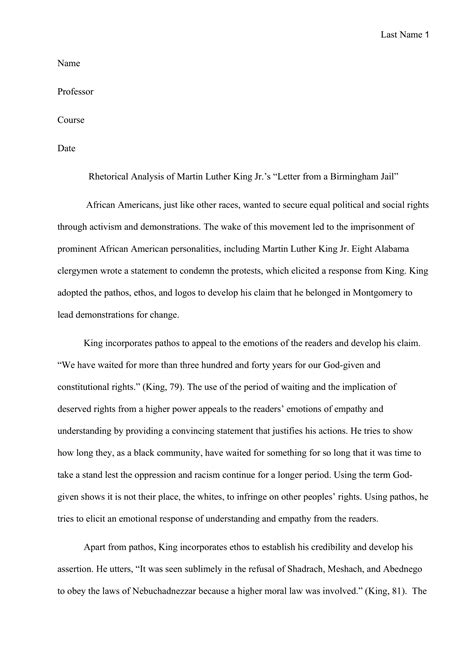Introduction: The Power of Words
Rhetorical analysis takes us on a journey to dissect and comprehend the profound influence of language in shaping our thoughts, beliefs, and actions. By scrutinizing the techniques employed by writers and speakers, we unravel the intricate tapestry of their persuasive strategies. This essay serves as a comprehensive guide, providing an example rhetorical analysis essay that elucidates the complexities of this discipline.

Understanding Rhetorical Analysis
Rhetorical analysis is the detailed examination of a text’s structure, language, and persuasive devices. It explores how language is strategically deployed to achieve a specific purpose, such as informing, persuading, or entertaining. By analyzing rhetorical strategies, we gain a deeper understanding of the author’s intent, the audience’s reception, and the broader societal context.
Analyzing a Rhetorical Masterpiece
To illustrate the process of rhetorical analysis, let us delve into an exemplary essay:
Title: The Enduring Legacy of Martin Luther King Jr.: An Analysis of His “I Have a Dream” Speech
Body:
1. Introduction:
This section establishes the significance of Martin Luther King Jr.’s iconic speech and provides a brief overview of its historical context.
2. Rhetorical Structure:
The essay dissects the speech’s meticulous organization and the logical progression of its arguments. It highlights the use of repetition, parallelism, and anaphora to create a powerful oratorical effect.
3. Language Analysis:
The essay examines the evocative language employed by King, noting his use of metaphors, similes, and allusions. It analyzes how these literary devices contribute to the speech’s emotional resonance and persuasive power.
4. Persuasive Techniques:
The essay identifies the persuasive techniques employed by King, including ethos (credibility), pathos (emotional appeal), and logos (logical reasoning). It explores how these techniques effectively engage the audience and inspire action.
5. Audience and Purpose:
The essay considers the intended audience of the speech and the author’s purpose in delivering it. It analyzes how the language and rhetorical strategies used are tailored to achieve the desired impact.
6. Impact and Legacy:
The essay concludes by discussing the profound impact of King’s speech, both at the time of its delivery and in the years that followed. It explores how the speech continues to inspire and shape the fight for social justice today.
Techniques for Rhetorical Analysis
To effectively perform rhetorical analysis, consider the following techniques:
- Closely read the text multiple times, paying attention to every word and sentence.
- Identify the author’s purpose, audience, and context.
- Examine the text’s structure, including the introduction, body paragraphs, and conclusion.
- Analyze the language used, including the choice of words, imagery, and rhetorical devices.
- Consider the implications of the text and its potential impact on the audience.
Strategies for Success
For a successful rhetorical analysis essay:
- Choose a text that you find compelling and that you believe has rhetorical significance.
- Research the author and the context of the text.
- Develop a strong thesis statement that expresses your overall interpretation of the text.
- Organize your essay logically and provide clear evidence to support your claims.
- Write in a clear and concise style, using precise language and avoiding jargon.
Pros and Cons
Pros of Rhetorical Analysis:
- Develops critical thinking and analytical skills.
- Enhances communication and persuasion abilities.
- Provides a deeper understanding of the complexities of language.
- Helps identify and understand different perspectives.
Cons of Rhetorical Analysis:
- Can be time-consuming and labor-intensive.
- Requires careful attention to detail and strong analytical skills.
- Can be subjective, as interpretations may vary.
FAQs
-
What types of texts can be analyzed rhetorically?
– Speeches, essays, articles, advertisements, social media posts, etc. -
What is the difference between rhetorical analysis and literary analysis?
– Rhetorical analysis focuses on the persuasive and communicative aspects of a text, while literary analysis emphasizes the aesthetic and creative elements. -
How can rhetorical analysis be applied in real-world situations?
– To evaluate arguments, understand political discourse, develop persuasive presentations, and improve communication skills. -
What is a rhetorical device?
– A technique used to enhance the effectiveness of a message, such as metaphors, similes, and parallelism. -
How can I find reliable sources for my rhetorical analysis essay?
– Consult academic journals, reputable news outlets, and credible websites. -
What are some common challenges in rhetorical analysis?
– Identifying the author’s purpose, understanding the context, and interpreting complex language.
Conclusion: The Power to Persuade
Rhetorical analysis offers a powerful lens through which we can understand the profound influence of language. By analyzing the techniques employed by skilled communicators, we gain valuable insights into the art of persuasion and the power of words to shape the world around us. This example rhetorical analysis essay serves as a beacon of guidance, illuminating the path to effective rhetorical analysis and empowering us to engage with the complexities of human communication.
